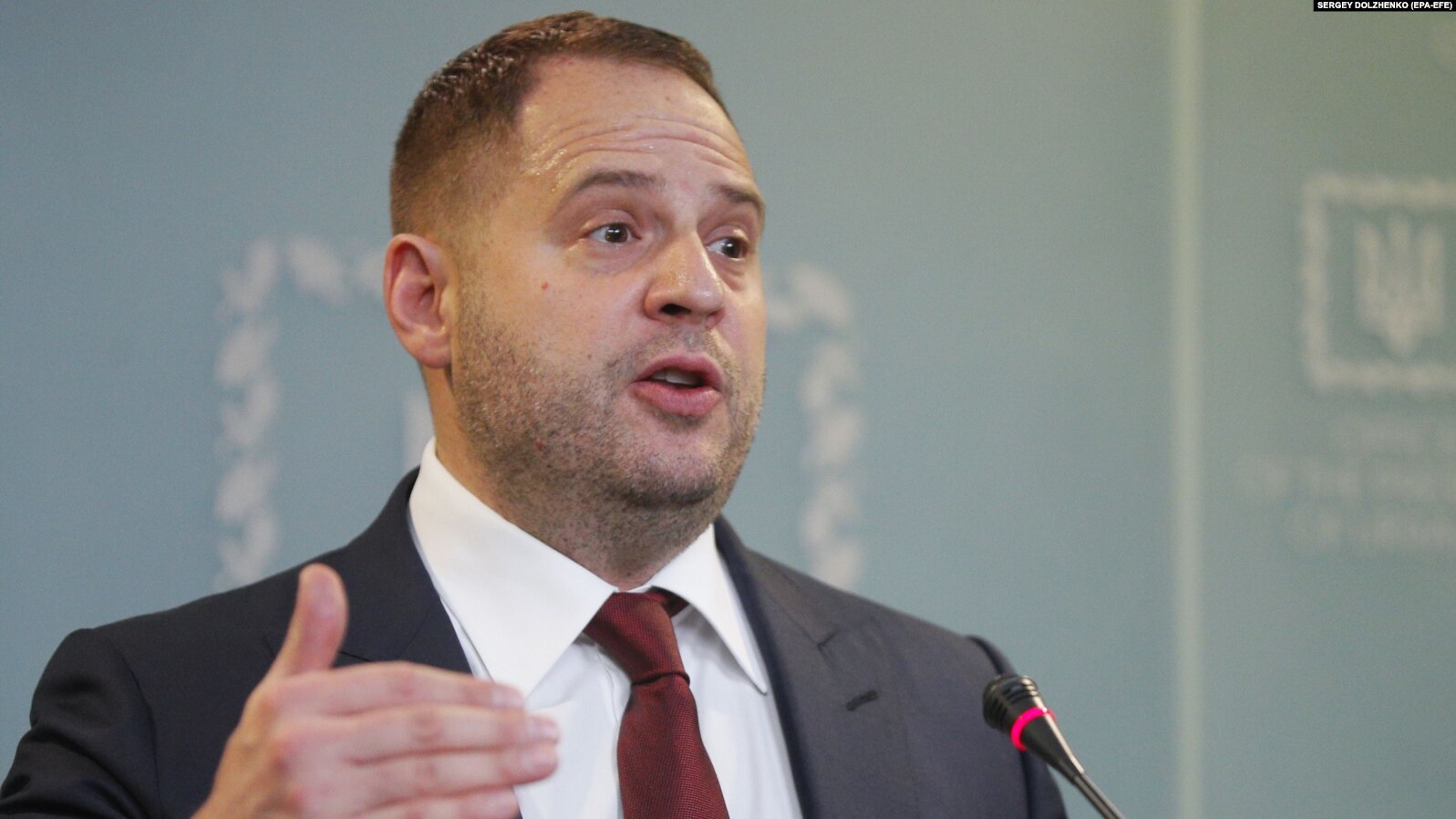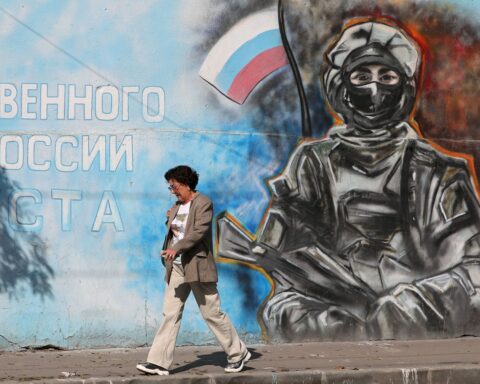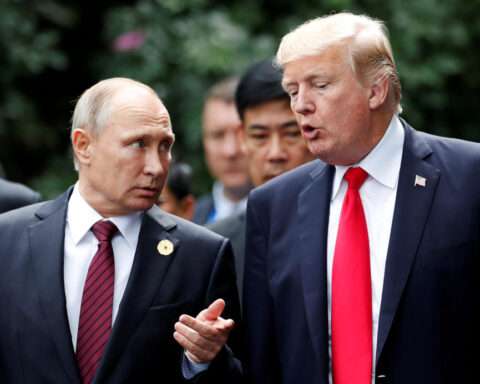Not national-security adviser Jake Sullivan. He called Andriy Yermak, the Ukrainian president’s chief of staff.
It wasn’t a mistake. The Ukrainian president’s top adviser wields political power far beyond his remit, including essentially directing foreign policy with Russia and the United States, and the May 29 call was seen as tacit acknowledgment of the clout Yermak wields.
“He has influence on almost all important decisions in the country,” former Ukrainian Prime Minister Oleksiy Honcharuk told RFE/RL. Honcharuk ranked Yermak as “probably de facto No. 2 after the president,” even though the prime minister and speaker of parliament have more power under Ukraine’s constitution.
The influence the 49-year-old Yermak has on Volodymyr Zelenskiy, a comedian-turned-politician now in his third year as Ukraine’s president, has raised eyebrows in both Washington and Kyiv, however. The concerns about the influential aide revolve around two key issues that are expected to be discussed when Yermak travels to Washington with Zelenskiy next month for the Ukrainian president’s first visit to the White House since he took office in May 2019.
Yermak has often been accused by critics and political opponents as being too cozy with Moscow, and close observers of Ukrainian politics who spoke to RFE/RL — including former Ukrainian and U.S. officials and analysts, business leaders, and civil-society members — say he has played a major role in slowing the pace of Zelenskiy’s reform agenda over the past year.
There are other related criticisms as well, including that Yermak jealously guards access to the 43-year-old Zelenskiy, allegedly preventing the novice president from receiving the full spectrum of views from both inside and outside government.

“He is trying to squeeze out everyone who can raise an alternative opinion, and ensures he has monopoly access to Zelenskiy,” Daria Kaleniuk, the executive director of the Kyiv-based Anti-Corruption Action Center, told RFE/RL.
Blocking Reform?
Another complaint stems from the Ukrainian government’s decision in late April to fire Naftogaz CEO Andriy Kobolyev, who had been in charge of the notoriously corrupt state-owned energy company well before Zelenskiy’s presidency, but was credited by many in the West with helping clean it up in recent years.
Analysts such as Oleksandr Kharchenko, a Kyiv-based energy expert who has advised Naftogaz, perceived Yermak’s hand behind the ouster, which Western governments viewed as a gross violation of corporate- governance ethics. The surprise move cast a long shadow over U.S. Secretary of State Antony Blinken’s first working trip to Ukraine just days later.
“I believe he moved the president in the direction [of changing Naftogaz management] that aligned with his own opinion,” said Kharchenko, who described Yermak as “really smart and an excellent tactician.”
During Blinken’s virtual meeting in Kyiv on May 6 with representatives of civil society, anti-corruption institutions, and Naftogaz and other businesses, Yermak was accused by some participants as being a key to efforts to block political and economic changes backed by Washington and Brussels.
Just a week later, U.S. lawmakers received a critical assessment of Yermak during meetings in Washington with representatives of Ukrainian civil society. “I don’t think he is a favorite of the West, neither in terms of the [domestic] governance side, nor in terms of his foreign-policy approach,” Adrian Karatnycky, a Ukraine expert and senior fellow at the Washington-based Atlantic Council, told RFE/RL.
Ukraine experts who are familiar with the situation told RFE/RL that Yermak was distrusted by some in Washington, in part due to an unproven but persistent allegations that he foiled a Ukrainian special operation to capture Russian mercenaries in neighboring Belarus in 2020.
His office has vehemently denied the claims, which have been pushed by Yermak’s predecessor and a pro-European political bloc close to former Ukrainian President Petro Poroshenko, who was defeated in 2019 by Zelenskiy.
Washington Trip
Hesitancy over Yermak’s role could affect his future as Zelenskiy seeks to reboot ties with the United States, Kyiv’s biggest backer in its opposition to Russia’s 2014 seizure of Ukraine’s Crimean Peninsula and war with Moscow-backed separatists, following a tense relationship with Washington under the administration of former U.S. President Donald Trump.
Yermak leads Ukraine’s talks with the Kremlin to end the fighting in eastern Ukraine that has left more than 13,000 people dead.
Despite strong words of support from the administration of U.S. President Joe Biden for Ukraine’s sovereignty and territorial integrity since taking power in January, the White House hasn’t rushed to embrace Zelenskiy’s administration — in part due to disappointment over reforms, according to analysts and former officials.
The White House reportedly dropped the idea of inviting Zelenskiy to the Oval Office before President Biden’s scheduled meeting with Russian President Vladimir Putin on June 16 following the Naftogaz management change. Zelenskiy is now expected to visit the White House in July.
Analysts and former officials also suggest that, amid the Naftogaz uproar, civil-society criticism, and suspicion about his ties to Russia, Yermak may be seeking to bolster his image in Washington in part to convince Zelenskiy that he is still the go-to man for relations with the United States.
In late February, Yermak published an opinion piece directed at a Washington audience on the Atlantic Council website saying Zelenskiy’s administration was “committed to working hand in hand with the new U.S. administration.”
Then, in early May, several U.S. lawmakers were sent a letter from the California office of American-Ukrainian businessman Igor Pasternak offering a meeting with Yermak later in the month. The letter described Yermak as Zelenskiy’s “chief national security adviser,” “the most powerful person in Ukraine after [the] president,” and a “power broker” for domestic and international affairs.
According to the letter, the goal of the meeting was to thank Congress for its support against Russian aggression and inform Congress about “the state of affairs in and around Ukraine.”
The letter came after the United States led allies in condemning Russia’s massive buildup of forces on its border with Ukraine in March and April. Russia has since pulled back some of its troops, but the situation remains tense.
Yermak’s trip to Washington never took place. According to one former U.S. official who spoke to RFE/RL on condition of anonymity, there appeared to be no interest on the U.S. side in a face-to-face meeting.
A foreign-policy aide to one of the lawmakers who received the letter, also speaking on condition of anonymity due to the sensitivity of the issue, told RFE/RL their office turned down the meeting because the request did not follow proper protocol by going through the Ukrainian Embassy in Washington.
The aide also cited concerns raised about Yermak’s reputation and the possibility the trip was more of a photo opportunity to show off his U.S. ties than to further Zelenskiy’s reform efforts.
The aide pointed out that members of the Ukraine Caucus in Congress had requested a meeting with Yermak in the autumn to discuss what appeared to be backtracking on key political and economic changes following his appointment as chief of staff in February 2020. While Yermak fell ill with COVID-19 around the time the request was sent, he never followed up with the U.S. lawmakers, the aide said.
In a statement to RFE/RL, Yermak’s office denied he had any plans to come to the United States in May and said the letter was the private initiative of Pasternak.
However, analysts say such “back-channel” diplomacy is exactly how Yermak likes to operate. “From the very beginning he was very skeptical about professional diplomats’ ability to conduct effective foreign policy,” Alyona Getmanchuk, director of the Kyiv-based think tank New Europe Center, told RFE/RL.
She and others pointed to Yermak’s willingness to meet in August 2019 with Rudy Giuliani, Trump’s personal lawyer, to discuss a possible Zelenskiy White House visit and U.S. military aid in exchange for Ukraine announcing an investigation into Biden’s son Hunter, who had recently left the board of a Kyiv-based natural-gas company.
Several Ukraine observers who believe that Yermak was behind Pasternak’s letter to U.S. lawmakers — or at least knowledgeable about its preparation — told RFE/RL he simply failed to comprehend that the Biden administration doesn’t operate this way.
But the Atlantic Council’s Karatnycky said he did not think Yermak was behind the letter, saying the aide “learned his lesson” about the dangers of back-channel diplomacy following the Giuliani incident.
Yermak’s involvement with Giuliani has not been forgotten by some in Washington, however, and is yet another reason for his cautious reception in the U.S. capital, according to analysts and former officials. The release this month of a phone call between the two men in 2019 has put the issue back in the headlines.
No Foreign-Policy Experience
Though Yermak is the de facto head of Ukraine’s foreign policy with the United States and Russia, analysts and former officials point out that he has no background in diplomacy.
Yermak studied law in Kyiv and went on to set up his own international legal firm in the mid-1990s. In the 2010s, he met Zelenskiy — then a comedian and producer — when he expanded into film production, and the two became close friends.
Yermak joined Zelenskiy’s presidential campaign and was initially named a presidential adviser for foreign affairs after the comedian’s surprise victory in April 2019. He traveled to Washington in July of that year to discuss a potential visit by Zelenskiy with Trump officials, including national-security adviser John Bolton.
Yermak, who has minor Russian business ties, struck a deal on a prisoner swap with Moscow in September 2019, delivering Zelenskiy a major win early on in his administration. Another prisoner swap — this time with the occupied territories in the east — would follow in December of that year.
However, Yermak’s negotiating position disquieted many people in Ukraine and the United States who felt he was too willing to accept key Kremlin demands. That, and suggestions by U.S.-based analysts that British intelligence had warned Zelenskiy in late 2020 that his right-hand man was a mole, fueled speculation he was an agent for Moscow.
Yermak’s talks with Moscow have since stalled, as highlighted by a flare-up of fighting with separatist forces and Russia’s show of force on Ukraine’s border this spring. Analysts and former officials say Russian President Putin has no interest in a resolution that would allow Ukraine to succeed as a sovereign nation.
A second former U.S. official who has met Yermak, speaking about the Ukrainian’s efforts to deal with Russia, described him as “misguided, mistaken, and overly impressed with his own ability to navigate these political currents.”
Top Spot
Yermak cemented the No. 2 position after he won an internal battle against former presidential chief of staff Andriy Bohdan, who previously worked as the personal lawyer of Ihor Kolomoyskiy, a powerful tycoon loathed in the West for his business tactics. Zelenskiy dismissed Bohdan in February 2020 after just eight months, replacing him with Yermak.
While some in the West were pleased that a man once close to Kolomoyskiy was no longer standing alongside the president, they would soon be disappointed by the series of decisions that would emerge from the president’s office.
A month after Yermak was promoted, Zelenskiy fired the reformist government put together by Bohdan. He also dismissed Prosecutor-General Ruslan Ryaboshapka, who was respected for his anti-corruption work.
Over the ensuing months key reform legislation slowed or reversed; people connected to the government of ousted pro-Russian President Viktor Yanukovych were put in important positions; and corporate governance at state-owned companies was undermined, among other letdowns.SEE ALSO:Zelenskiy’s First Year: He Promised Sweeping Changes. How’s He Doing?
Several of the people who spoke with RFE/RL for this article said they believe Yermak played a key role in these developments.
Former Prime Minister Honcharuk said Yermak wasn’t driven by some kind of strong political ideology, but what is best for the president’s ratings in the short term. In an interview with Interfax in July 2019 that a U.S. official highlighted in an e-mail to White House and State Department officials as “worth a read” for its insight into Yermak, the aide said his motivation derives from his “unconditional faith” in Zelenskiy.
The Ukrainian president’s approval ratings have been tumbling since his honeymoon period ended in late 2019, falling from 67 percent in June of that year to 38 percent in March, according to a survey by the International Republican Institute.
The president has announced a series of populist measures in recent months — including temporarily capping domestic gas prices, bashing tycoons, and targeting Russian-leaning politicians — that some say are now giving his ratings a slight bounce.
Rumors have percolated in Ukrainian media that deputy chief of staff Kirill Tymoshenko or Security Service chief Ivan Bakanov are eagerly waiting in the wings should Zelenskiy grow frustrated with Yermak.
However, Ukraine expert Karatnycky said Zelenskiy’s trust in Yermak was “so strong” that it can effectively “neutralize” the impact of Western doubts and slumping ratings.
Todd Prince






